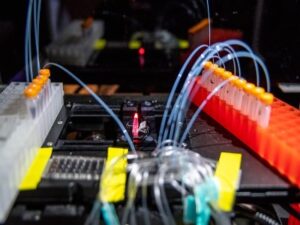
DNA synthesizers are used for the chemical synthesis of DNA and oligonucleotides in research and diagnostic laboratories. They provide an efficient and cost-effective solution for DNA assembly and custom DNA synthesis for applications in gene editing, genomics, and molecular biology research.
Market Dynamics:
The growth of the DNA synthesizer market is driven by the increasing demand for custom DNA due to applications in gene editing and genomics research. CRISPR/Cas9 technology is being widely adopted for gene editing applications and is driving demand for custom DNA. Additionally, growing genomics research for studying genetic mutations and biomarkers of diseases is also fueling market growth. Additionally, technological advancements in DNA synthesis techniques allowing for longer oligo synthesis at lower costs is further supporting market expansion over the forecast period.
DNA Synthesizer Market Drivers
Increasing Applications of DNA in Biotechnology and Pharmaceutical Industry
The growing applications of DNA in biotechnology and pharmaceutical research is one of the major drivers fueling the growth of the global DNA synthesizer market. DNA synthesizers play a vital role in DNA amplification, sequencing and genetic modification which are extensively used in various biotechnology and pharmaceutical applications such as drug discovery, vaccine development, genomics, proteomics, and gene therapy research. According to the World Health Organization, global expenditure on pharmaceutical R&D rose to almost USD 179 billion in 2018 from USD 165 billion in 2017. This rising investment in pharmaceutical R&D is creating strong demand for various DNA technologies including DNA synthesizers.
Advancing Technology and Automation in DNA Synthesizers
Advancements in DNA synthesizer technology and increasing level of automation are positively impacting the market growth. DNA synthesizers with advanced features such as miniaturization, increased throughput, enhanced accuracy and productivity are gaining more popularity among end users. Continuous technological innovations are enabling manufacturers to introduce smaller, more efficient and automated DNA synthesizers. For instance, in 2019, Agilent Technologies launched the next generation nucleotide solution kit and workflow software for DNA synthesis further automating the synthesis process and shortening research cycle times while improving accuracy. Such innovations are expected to further accelerate the adoption of DNA synthesizers.
DNA Synthesizer Market Restrain
High Cost of DNA Synthesizers
The high cost associated with the purchase of DNA synthesizers is a major factor hindering the growth of this market. Due to high precision capabilities and advanced features, DNA synthesizers come at a very high initial purchase price which is a significant barrier, particularly for small and medium research laboratories and institutes with budget constraints. For instance, basic DNA synthesizers with limited features cost anywhere between USD 20,000 to USD 100,000 while advanced DNA synthesizers compatible for automation and high throughput screening may cost over USD 200,000 which is a huge investment for most end users. In emerging economies, limited funding for biomedical and biotechnology research also adversely impacts market development to some extent.
DNA Synthesizer Market Opportunity
Increasing Research Activities in Developing Countries
Developing countries in Asia Pacific and Latin America region are witnessing rising investments in biomedical and biotechnology research from both public and private organizations. This growing focus towards bioscience research in developing nations presents significant growth opportunity for DNA synthesizer market players. Additional funding for life science research, increasing number of collaborations between academic institutions and industry, establishment of bioscience clusters and investment in infrastructure are some of the factors fueling opportunities. Moreover, economic growth in developing countries is enabling improved access to advanced technologies, further driving DNA synthesizers demand for academic and industrial applications. Market players can leverage this opportunity by strengthening their distribution networks and offering favorable financing options in developing markets.
DNA Synthesizer Market Trends
Advent of Cost-Effective Solid-Phase Automated DNA Synthesizers
One of the prominent trends shaping the future of DNA synthesizer market is the emergence of cost-effective solid-phase automated synthesizers. Traditionally, DNA synthesizers based on phosphoramidite chemistry were expensive and required highly skilled professionals for complex programming and operation. However, recent offerings by firms such as Merck KGaA and GenScript are changing market dynamics by introducing affordable benchtop synthesizers compatible for multiple reactions to be performed simultaneously. These new generation solid-phase synthesizers have dramatically reduced the overall cost per base DNA synthesis. Further, their ease of use and touchscreen interfaces eliminate the need for advanced programming skills. This trend of low-cost automated solid-phase synthesizers with simplified workflows is making DNA synthesis more accessible and opening up market opportunity beyond traditional core end users.












